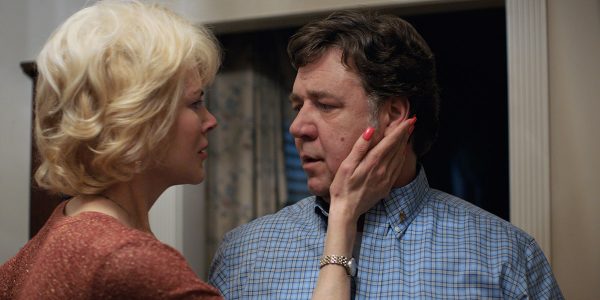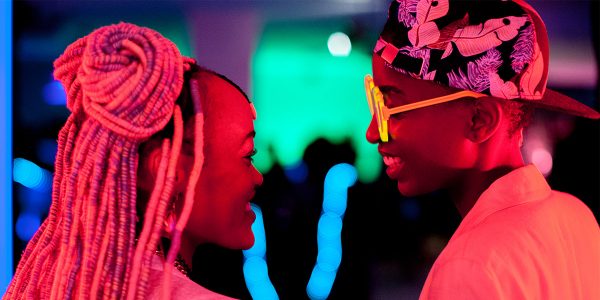By Andrew Kendall in Toronto
At this year’s Toronto International Film Festival, there are two notable scenes from separate films, which seem to be speaking to each other across continents; the Kenyan film “Rafiki” and the American film “Boy Erased.”
In “Boy Erased,” the moment is one the film seems to have been inevitably crawling to. Jared Eamons is the son of a Baptist pastor sent to a gay conversion therapy programme after being outed to his parents. Despite the almost banal allure of normalcy and positivity the therapy sessions try to at first induce, we know that this cannot and will not end well.

And so, in a late scene, one of the boys who is not responding to the “treatment” is the victim of a quasi-demon-exorcism scene. Prostrate on the ground, the boy is beaten with a Bible. The Bible thumps on his back continuously, the sound resounding throughout the room, as the demons are commanded to leave him.
The moment is reflected in a scene later on in “Rafiki,” a film where two young girls burgeoning romance are threatened by the societal and religious responsibilities that affect Kenya, where homosexuality is illegal. A girl sits in a church as a group of church women attempt to expel the demon of homosexuality from her.
To lay the moments in the films down through text make them sound almost nonsensical. Of course, homosexuality is not precipitated by demon possession. And yet, in actuality, both films consider the ways that homophobia manifests itself in almost ridiculous ways, dependent often – although not always – on the shield of religion. The central moment explicates the most potent argument that anti-gay critics use – the Bible does not allow and does not endorse it.
The moments bring the two films together in a way that’s key and essential in 2018, as the Caribbean and the larger world wrestle with the realisation that homosexuality is not going anywhere.
I saw “Rafiki” on the same day that India had finally struck down its colonial laws and decriminalised homosexuality. While chatting with writer/director Wanuri Kahiu at the end of the screening, she grinned when I mentioned the fact. It emphasised the relevance of “Rafiki.” The film itself has been banned in Kenya, where a case is before the courts challenging the constitutionality of its own anti-gay laws. In a late scene, two police officers tease two victims of a hate-crime. The law is oftentimes not lawful. But beyond the role of law in encouraging homophobia, it is the role of religion that both films handle so deftly.

Religion as the great saviour from homosexuality when presented in this way seems to tip the hand against religious zealots that tend to find representations of anti-gay bigots offensive, even as these representations are pulled from real world incidents. When presented in stark colour and vivid images, the explicit symbol of a Bible thumping a back or an almost violent laying of the hands in some façade of deliverance, emphasises the struggles of being gay and the ways it threatens to undo those who yearn to stay close to their religion.
The two films are vastly different. “Rafiki” is not explicitly centred on religion but instead on Kenya as a whole. “Rafiki” means friend. The colourful village is almost a character complete with its cast of familiar “types” that are familiar in African and Caribbean art – the town gossip, the charming but somewhat philandering father, the stern mother. “Rafiki” depends on its familiarity of beats.
Kahiu was intent on showing the world Kenya in a way that is not always appreciated; not as some exotic ghetto but as a place of real feelings and emotions. Newcomers Samantha Mugatsia and Sheila Munyiva have a chemistry that’s immediately joyful to watch, adding a cadence to the film that’s innocent but still profound. The subplot of a local election adds poignancy to the film, articulating the way that the personal becomes the political when identity politics are given their value.
“Boy Erased” is more explicitly about religion than about society. The forced choice of ‘your religion or your sexuality’ that’s posed to Jared is gently handled in a way that becomes moving.
“Boy Erased,” instead of tracing a process of coming out, begins with the therapy. Joel Edgerton’s direction (and his trust in Lucas Hedges, who is rarely off-screen in the film) is nuanced and affecting even if it at first seems muted. He cuts the linear narrative of Jared at therapy with elongated flashback scenes which add texture to his family and home life in ways that belie what seems to be familiarity of the film’s premise.
“Boy Erased” surprises in how gentle it is to the church, even as it admonishes them. It is not a lacerating censure of religion; it knows it doesn’t need to be. The way the camera seems to hold back from judgement becomes its key. Edgerton knows he does not need to hold our hands, because the pain of what transpires on screen and the way that the goodness of religion becomes bent into something horrific is clear enough on its own, without hectoring. Nicole Kidman, as a mother uncertain as to how to deal with her son’s homosexuality, has excellent chemistry with Hedges and her late-in-the-film heart to hand avoids schmaltz to become poignant.
Ultimately, both “Rafiki” and “Boy Erased” emphasise the important roles parents play in the lives of their gay children.
In Kenya, “Rafiki” was accused of being too hopeful a film, and to take the story on its own, the outcome for the real Jared (Gerard Conley) is better than the worst experiences of those who go to gay conversion therapy.
But to look at the hope that both films bring at their end is to ignore the real hurt and pain that gets one there. There’s a pulverising scene of gay bashing in “Rafiki” that is mercifully shot in an almost indistinct darkness. The film argues for the future of African cinema in a way that’s vivid and moving. 2018 has been rewarding in its offerings of LGBTQ cinema. Both films offer stories of gay persons on screen in a 2018 that feels at once hopeful and hopeless for gay persons around the world. “Rafiki” and “Boy Erased” are different in their goals and their final products but both argue for the importance of family and hope for young, gay persons, and in this way, become two of the more rewarding films the festival has offered thus far.




